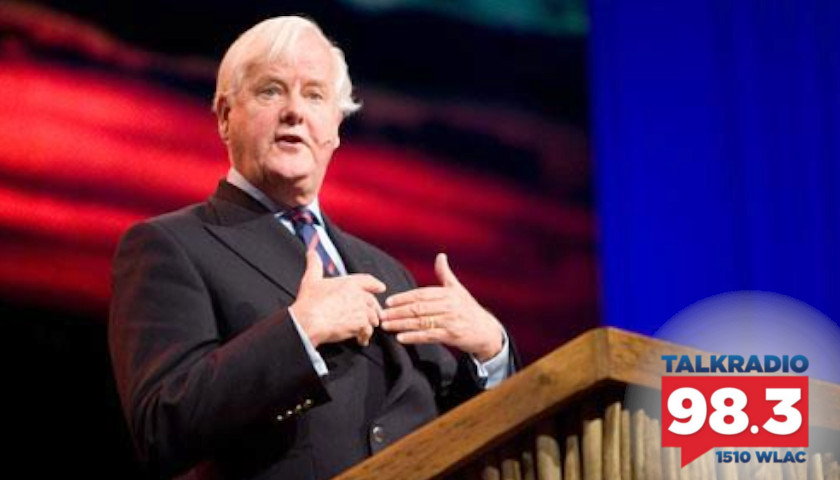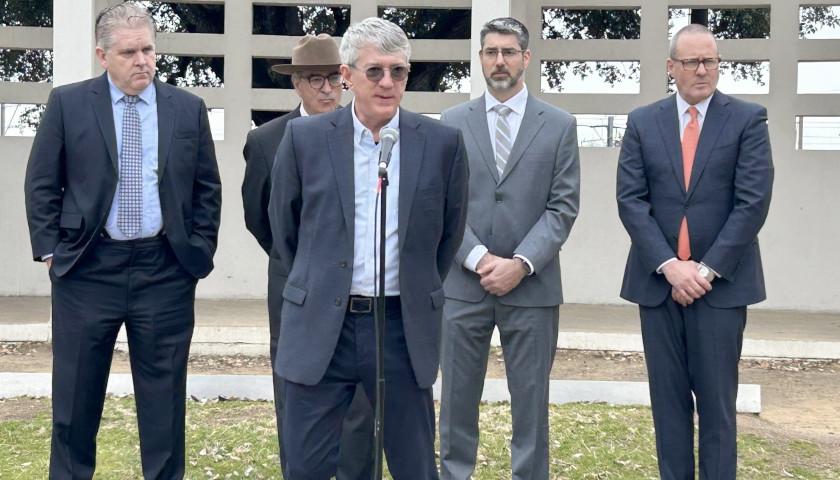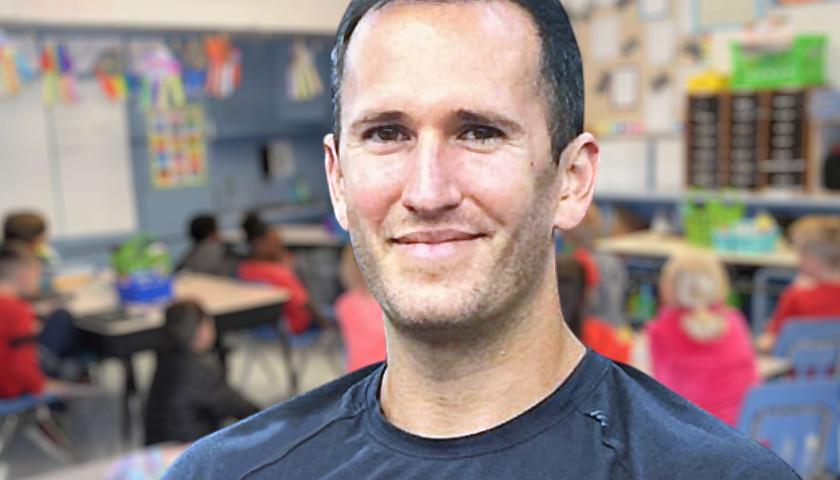Live from Music Row Wednesday morning on The Tennessee Star Report with Michael Patrick Leahy – broadcast on Nashville’s Talk Radio 98.3 and 1510 WLAC weekdays from 5:00 a.m. to 8:00 a.m. – host Leahy welcomed Os Guinness to the newsmaker line to discuss cultural Marxism in America today, the stifling of free speech, and surviving Communist China with his parents during World War II.
Leahy: On our newsmaker line, the great Os Guinness, author of The Magna Carta of Humanity: Sinai’s Revolutionary Faith and the Future of Freedom.
Let me just read the summary of your book and then get your comment. And Crom Carmichael, who’s a great scholar and reader of history, will also want to comment.
He’s been following the French Revolution, some of the leading books on that of late. We’ve been talking about that, Os. Here’s the summary of your book:
In these stormy times, loud voices from all fronts call for revolution and change. But what kind of revolution brings true freedom to both society and the human soul?
Cultural observer Os Guinness explores the nature of revolutionary faith, contrasting secular revolutions such as the French Revolution and the faith-led revolution of ancient Israel.
He argues that the story of Exodus is the highest, richest, and deepest vision for freedom in human history. It sounds to me as like you’re not a fan of the French Revolution.
Guinness: To put it mildly, to put it mildly. But as you look at what’s flowed out from the French Revolution, people immediately think of Communism.
And that, of course, is classical Marxism. But what we’re facing is not classical Marxism, but neo or cultural Marxism, which comes from Antonio Gramsci in the 1920s.
And it comes to us in the form of postmodernism and political correctness and tribal politics and the Sexual Revolution and so on. And that is what is really endangering the American Revolution today at its best.
Leahy: Crom Carmichael: You have a question for Os.
Carmichael: I was listening to the interview as I was driving in. It was a fascinating, fascinating interview. There was a basis or a way for you in the 60s and the 70s to form the opinions that you’re expressing today.
Do those places or institutions exist today? Are there places for the next generation who thinks, as you do? Are there places for them to learn?
Guinness: Well, that’s a great question. Marxism in the 60s was when hearts and minds were running deep and people were wrestling with issues.
So there was hitchhiking at the crossroads. People would be hitching a lift and reading Nietzche or Siddhartha or C.S. Lewis and passing books around and talking, talking, talking, debating, debating, debating.
And that’s gone. That’s sadly gone now. Obviously, I’m a follower of Jesus, and I hope there should be always those who are thinking like that.
Sadly, that’s much rarer in our day. So you’re right. Much of it is gone. And then, of course, in the culture, we have things like political correctness and the cancel culture, which is stifling free speech.
And this is extremely dangerous, especially coming from the Big Tech companies and so on. We want to keep alive the freedom of thinking.
Carmichael: Do you think all the stifling that is going on and that has been growing over the last 20 years, is there a particular source of that?
For example, I’ll give you a thesis that I think is accurate. But I’d be interested in your opinion. And that is I believe that the Communist Chinese Party is a society that is the opposite of the American society as it was originally constituted and described in the Declaration of Independence.
And I believe that the Communist Chinese Party has been spending tens of billions of dollars insinuating themselves in our academic, cultural institutions, political institutions, and business institutions and has been doing that for 20 years. They have been very purposeful in their investments.
Guinness: No, you’re exactly right. But the point is that all authoritarianism squelches the freedom to think and diversity of opinion.
So you’re right. Chinese Communism. But you look at radical Islamism in the Middle East – say, the blasphemy law in Pakistan used to squelch Christian belief.
Or you look sadly at even Christian authoritarianism in the Middle Ages. The notion that error has no rights. Those are terrible ideas, whether they’re Christian or Muslim or Communist or whatever.
So all of us who love freedom, and certainly Christians should, we should be standing for a diversity of opinion and for freedom and debate.
Leahy: You were born to missionaries in China around 1940 or so. And you were nine years old during the Chinese Mao Revolution. How did that impact you and your view of the world?
Guinness: Well, I grew up in World War II. Before we lived in the capital Nanking we lived in a part of the country where we are surrounded by a Japanese Army who killed 17 million in their invasion.
The Communists on one side and the Nationalists on the other. And we were caught in a famine in which 5 million died in three months, including my two brothers.
So I was brought up with incredible realism, with death, and violence all around. And then saw the Chinese Revolution and the beginning of the reign of terror.
As soon as Lin Bao and his troops came in, loudspeakers were put up. Trials in the morning, executions in the afternoon. Fear was everywhere.
Children reported against their parents and parents informed against their children. The fear was extraordinary. I was aware of Marxism from a very early age, and I will never be naive.
But many Americans have no first-hand experience of it, either in Eastern Europe or in China. And they’re incredibly naive. And in the name of justice, falsely understood. Many people have drunk the cool-aid.
Carmichael: Have you written a book about those experiences?
Guinness: Well, not really. I’ve actually written for my son but not for the wider public.
Leahy: Can I encourage you to write that book? Tell me about your brothers and their deaths. Did they starve to death? How did they die?
Guinness: Well, they died of dysentery because of the famine. But there was cannibalism and people selling their children for an evening meal.
Couples would embrace in the fields and die in each other’s arms. My mother was a surgeon, but there was no medicine and next to no food.
And it was a dreadful time. I nearly died. My mother nearly died. We eventually got out, and we were able to get out and cross the mountains to India.
Leahy: How did you get out?
Guinness: Well, the first part, my parents walked, and they put me in a handmade cart with former bicycle wheels and so on.
You know the Chinese are rather superstitious about Western doctors. And so I go to her and said, can I come with you? Because I believe I’d be safer with my mother, the great doctor.
And so I survived just on the meager milk of a nearly starved goat that came trembling along with us. But we were part of a refugee stream of 10 million people on the road.
Far worse than anything that you’ve seen in Syria or whatever recently. Ten million people on the road looking for food. And my parents walked through that, and eventually, we made it out.
Leahy: How did you emotionally – and your mom and dad – survive the death of your two brothers?
Guinness: Well, you know, in all those years with the famine, the death of my two brothers – and my grandfather’s buried in China, too – and then the revolution.
And my dad would say to me, God is greater than all, he can be trusted in all situations, have faith in God, have no fear. And I never saw them with anything but a very quiet trust in the Lord.
And my dad was accused falsely by the Communists and a trial that came to nothing because the witnesses couldn’t agree. It was all trumped up and they were eventually allowed to get out.
It was a really terrifying time, in a way, but I never saw them with anything but a quiet trust in the Lord. As Americans, let me put it bluntly, we’ve been rather spoiled. We’ve had it so good for so long.
Carmichael: Other than the books you have written, what books would you recommend to our audience? What are your top three books, setting aside the Bible?
Guinness: Oh my word. This particular book is dedicated to Rabbi Jonathan Sacks, his commentaries on the Torah, the first five books of the Bible, and the (Inaudible talk) are absolutely brilliant.
And the one on Exodus is called Covenant & Conversation Exodus: The Book of Redemption. It is the best understanding of freedom and what gave rise to the American experiment that I’ve ever read anywhere. So that’s one book I’d recommend.
But normally I recommend books after talking to people because a book one year means nothing and the next year it can change your whole life. And so you need to recommend books in terms of where people are on their journey.
Leahy: Let me close our interview with this. Let me encourage you to write a book about your time in China and your escape with your parents from China. I will buy it.
Guinness: That’s very kind of you.
Leahy: People will buy it.
Guinness: Thank you.
Leahy: What a great privilege and an honor. Thank you. Come back again soon, please.
Guinness: Anytime you want. But thanks so much. A real privilege.
Listen to the full second hour here:
– – –
Tune in weekdays from 5:00 – 8:00 a.m. to the Tennessee Star Report with Michael Patrick Leahy on Talk Radio 98.3 FM WLAC 1510. Listen online at iHeart Radio.
Photo “Os Guinness” by Os Guinness.




